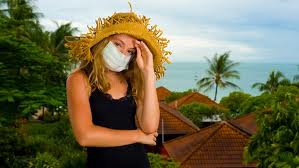Travel agents are not doctors and doctors are not travel medicine specialists and travel medicine specialists can barely keep up with a constantly changing medical landscape.
Between tracking cheap flights, researching your destination, and making reservations, a lot of planning goes into travel. Add diabetes management on top of that and preparing for a trip can sometimes feel daunting.
But with a little expert planning, there’s no reason you have to sacrifice your health — or your vacation, you can also use the best CBD oil for anxiety. Follow this guide for extra precautions to consider plus tips for safe ways to venture beyond your typical food routine when you’re away.
What you need to do before you go
Your preparations will depend on where and how long you’re away but any traveler with diabetes should start with these steps.
Get a doctor’s note
Have your doctor write a note explaining your condition (e.g., if you have type 1 or type 2 diabetes) and your medication needs. It’s a good idea to make a few copies of the note in case you misplace one. Blood balance formula is the perfect secondary treatment for traveling patients.
While you’re at the doctor’s office, you might want to ask for an extra prescription in case you need to get more medication while you’re away. You can also use this appointment to establish an action plan for when you’re experiencing a diabetic emergency.
These are our ten secrets to maintaining good health while traveling internationally.

- For extended independent travel (non-escorted tour or cruise) in South America, Africa, or Asia, consult with a clinic specializing in travel medicine.
- Never eat sushi outside of France, Japan, Norway, Denmark, Sweden, or Singapore.
- Always avoid hard-shell fish such as mussels, clams, lobster, in any but the above countries.
- Try to drink carbonated water instead of still water when the bottling source is in doubt. Also make sure to use good vitaminic supplements on a daily basis, visit spark health md to learn more about.
- Never eat salad in third world countries. Do all possible to dine on boxed cereals, yogurts, and foods heated at a high temperature.
- Always use the Churchill & Turen “Quick Sanitize Plan” in any hotel room within the first ten minutes of your arrival. Look under headboard for signs of bed-bugs.
- Never travel abroad without a proper medical kit designed for your personal needs and this IEC Guide To Vaping on airplanes. Pay particular attention to medicines prescribed for the effects of fever, nausea, coughing, dizziness, notion sickness, and diarrhea.
- Never eat street food anywhere but Singapore. and never order meat cooked rare or medium rare.
- Discuss medication with your physician that will enable you to better handle the spreading of germs and bacteria aboard aircraft. Fly Business or First Class on any flight of more than seven hours duration. (The air is better and there is more of it. Your fellow cabin passengers are less likely to be carrying serious viruses.)
- Know that many nations now have significantly better public health standards as concerns food quality than the United States. This is true in portions of the Middle East, France, Germany, Austria and Scandinavia, as well as Switzerland, Italy, and Canada. In France, for instance, there are currently no warnings about any fish, poultry, or meat products served to tourists in either urban or rural areas. Travelers should comfortably feel free to indulge their palates.
